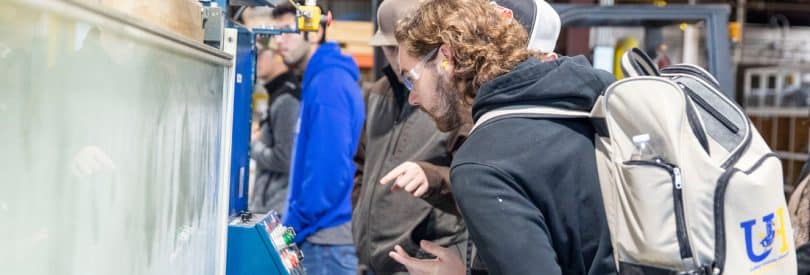
The engineering technology program at Southern Arkansas University is a professional degree that specializes in design and analysis in the broad area of engineering technology. The degree will provide skills for graduates to become real world problem solvers. Most of the courses are applied in nature and provide students with the necessary skills to be real world problem solvers in the engineering and manufacturing technology industry. Students will be introduced to modeling and design tools that are widely used in the current job market. More focus will be given to applied aspects rather that theoretical aspects of engineering. Most of the courses will be taught by engineering professors that have work experience in industries. Some of the courses from the engineering program will transfer to the engineering technology program.
University Requirement (2 hours)
GSTD 1002 – Freshman Seminar
General Education (18 hours)
English Composition (6 hours)
Fine Arts/Humanities (6 hours)
U.S. History/Government (3 hours)
Social Science (3 hours)
Note: 17 hours of mathematics, biological science, physical science, social science, and fine arts/humanities requirements are included in the major.
Chemistry (4 hours)
Select one of the following course combinations:
CHEM 1013 – College Chemistry I and CHEM 1011 – College Chemistry I Lab
or
CHEM 1023 – University Chemistry I and CHEM 1021 – University Chemistry I Lab
Mathematics (8 hours)
MATH 3043 – Applied Probability and Statistics I
MATH 1525 – Calculus I or MATH 2125 – Applied Calculus
Physics (8 hours)
Select one of the following 8-hour course sequences:
PHYS 2003 – College Physics I and PHYS 2001 – College Physics I Lab
PHYS 2103 – College Physics II and PHYS 2101 – College Physics II Lab
or
PHYS 2203 – University Physics I and PHYS 2201 – University Physics I Lab
PHYS 2213 – University Physics II and PHYS 2211 – University Physics II Lab
Technical Courses (64 Hours)
AGED 2021 – Agricultural Metals and AGED 2022 – Agricultural Metals Lab
ENGL 3023 – Technical Writing
ENGR 1023 – Introduction to Engineering and ENGR 1021 – Introduction to Engineering Lab
ENGR 1212 – Engineering Graphics
ENGR 2033 – Electrical Circuits I
ENGR 3143 – Manufacturing Processes and ENGR 3141 – Manufacturing Processes Lab
ENGR 3163 – Computer-Aided Design and Analysis
ETEC 2003 – Applied Statics
ETEC 2033 – Solid Modeling and Design
ETEC 3002 – Applied Mechanics Lab
ETEC 3003 – Applied Fluid Mechanics
ETEC 3012 – Applied Thermal Science Lab
ETEC 3013 – Applied Thermal Science
ETEC 3033 – Strength of Materials
ETEC 4003 – Heating, Ventilation, and Air Conditioning
ETEC 4013 – Senior Design for Technology
ITEC 2032 – Industrial Safety
ITEC 3073 – Economic Analysis for Technology
ITEC 3503 – Computational Methods
ITEC 3803 – Industrial Materials
ITEC 4123 – Computer Aided Manufacturing or ITEC 4043 – Advanced Manufacturing Systems
Select 3 hours from the following:
ENGR 3103 – Digital Electronics
ETEC 2023 – Programmable Logic Controllers
ITEC 3263 – Operations Management I
Electives (16 hours)
16 hours of upper-level Engineering or Technology electives
Total Hours – 120
| Department: | |
| Hours Required: | 120 |
| Categories: | Major, Undergraduate |
| Delivery: | On-Campus |
The engineering technology program at Southern Arkansas University is a professional degree that specializes in design and analysis in the broad area of engineering technology. The degree will provide skills for graduates to become real-world problem solvers. Most of the courses are applied in nature and provide students with the necessary skills to be real-world problem solvers in the engineering and manufacturing technology industry. Students will be introduced to modeling and design tools that are widely used in the current job market. More focus will be given to applied aspects rather than theoretical aspects of engineering. Most of the courses will be taught by engineering professors that have work experience in industries. Some of the courses from the engineering program will transfer to the engineering technology program.
Learning Goals
- Our graduates effectively communicate scientific knowledge.
- Our graduates have the knowledge to make informed and ethical scientific decisions.
- Our graduates utilize appropriate quantitative skills in making decisions.
- Our graduates demonstrate the information literacy required for scientific study.
- Our graduates possess the knowledge and skills in engineering and the physical sciences to be successful.
